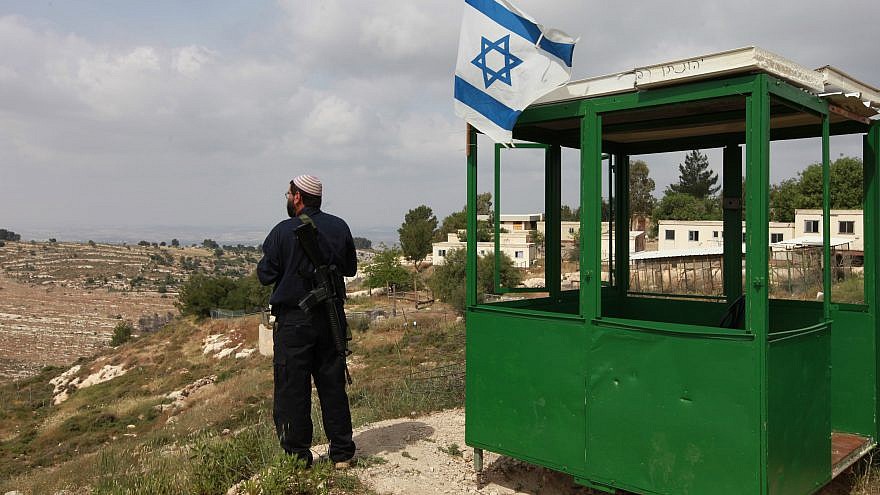As American society has become more polarized in recent years, the debate over gun control has reflected this reality, with leaders and lawmakers on both sides firmly entrenched in their positions. Yet the recent school shooting at Marjory Stoneman Douglas High School in Parkland, Fla., which left 17 dead—14 of them teenagers— has transcended the usual debate on gun control as an entire new generation, fed up with violence in their schools, has launched a social movement for change.
While school shootings seem to be a uniquely American phenomenon, Israel is no stranger to violence. Anyone who has visited the Jewish state quickly becomes accustomed to seeing security guards in nearly every public venue, including schools, with Israeli soldiers carrying M16s slung over their shoulders. Many supporters of gun rights have pointed to Israel as a potential model for the United States.
“Just waking up in Israel to news of heartbreaking school shooting in FL; Reminded that Israel pretty much eliminated it by placing highly trained people strategically to spot the one common thread—not the weapon, but a person with intent,” tweeted former Arkansas Gov. Mike Huckabee following the Parkland tragedy.
Similarly, Wayne LaPierre, executive vice president of the National Rifle Association, has praised Israel for placing armed guards at schools, saying in December 2012 following the school shooting Newtown, Conn.—which left 20 children ages 6 and 7 dead, along with six staff members—that “the only thing that stops a bad guy with a gun is a good guy with a gun.”
‘How to respect the weapon’
While some may point to Israel as an exemplar of how a society with widespread gun ownership can still prevent school shootings and gun violence in general, several key differences exist between the United States and Israel.
A 2012 study by Janet E. Rosenbaum, an epidemiologist at SUNY Downstate Medical Center in Brooklyn, N.Y., examined the perception of many gun-rights advocates, noting that Israel and Switzerland are “gun utopias” with permissive gun laws and widespread gun ownership, and that they encourage the arming of civilians who can confront shooters.
She concludes that “Swiss and Israeli gun ownership is rare [and] regulated stringently, such as by putting the burden of proof on permit applicants to demonstrate a specific need for a gun,” adding that neither country promotes gun ownership.
Unlike America, where gun rights are protected by the Second Amendment, there is no parallel in Israel’s legal framework. Instead, like most of the developed world, Israel has strict gun-control laws, where gun ownership is considered a privilege granted by the Ministry of Public Security—not a right. As such, only a small percentage of Israelis—about 135,000 citizens out of some 8.5 million people—are licensed to carry guns. Contrast that with the United States, with its estimated 300 million firearms, nearly one for every man, woman and child.
Simon Perry, professor at Hebrew University’s Institute of Criminology in Jerusalem and co-director of the Program in Policing and Homeland Security, dismissed the lessons people appear to have drawn from Israel’s gun-control policies. Firstly, “the people who refer to Israel as an example of successful gun control see a lot of weapons on the street, but these are soldiers on the way to or from base, not ordinary civilians.”
According to Perry, there are two major differences between Israel and America when it comes to gun control. “One, in the U.S., it is easy to obtain a weapon. In Israel, it is very difficult. If you want one, you need to have a very good reason why. At most, you can get a small caliber pistol, not an automatic or semi-automatic rifle. The process makes it very complicated to obtain a weapon. And two, the fact is that most Israelis undergo some type of training in the military. Even in lower-level basic training, they treat you how to respect the weapon. Israelis know how to handle weapons. The gun culture you see in America is not accepted by Jews or Arabs in Israeli culture.”
He added that “we don’t have a lot of school shootings because we have security in schools to protect against terror attacks.”
‘More can and should be done’
For American law enforcement, the best lesson from Israel may not be the fact that a security guard is armed, but that a greater focus is placed on that guard’s training and state of mind.
Shortly after the Parkland shooting, U.S. President Donald Trump blamed Marjory Stoneman Douglas High School resource officer Scot Peterson, saying he “didn’t have the courage” to run inside and confront teen shooter Nikolas Cruz. But Perry retorted: “It’s not about courage. It’s a state of mind. We test our security system on a daily basis. People have to be alert, aware and constantly checking. It’s important to understand how to keep people prepared for this type of instance. Training is not enough.”
Perry listed two major elements that define criminal behavior: motivation and opportunity. “If you prevent a criminal from obtaining a weapon, you remove the opportunity. You need to build systems that will prevent people like this from purchasing such weapons. You need to build the system that actively deals with finding these people and have someone who deals with it exclusively, working on it full-time” in order to prevent similar such tragedies.
American law enforcement is already considering these suggestions.
The Broward County Sheriff’s Department, led by Sheriff Scott Israel, told JNS that “there is no simple solution for this very difficult problem,” but pointed to several measures that it believes could help prevent future attacks.
“First, and most importantly,” it noted, “is creating Violent Threat Restraining Orders because they will empower the justice system to prohibit the sale or possession of guns to violent or individuals deemed to be mentally ill.”
The department added that “another reform is to strengthen the Baker Act, so that those who are involuntarily committed to mental-health institutions have their firearms temporarily removed from their possession and not permit them to reacquire those weapons until a court approves.”
Additionally, “threats of violence made online are not always arrestable offenses. Sheriff Israel supports the efforts of law-enforcement leaders around the state to urge legislators to close a loophole in Florida law so that police can make an arrest when broader online threats are made.”
The Sheriff’s Department concluded that “more can be done and should be done … A uniform national system of mandatory background checks should be implemented to stop criminals and the mentally ill from acquiring guns. This will take bipartisan consensus in Washington to make this a reality.”
Asked if police support a ban on AR-15 types of assault rifles, the department said: “Sheriff Israel supports common-sense gun reform, including reinstating the federal ban on assault rifles, and banning the sale and possession of modifiers such as bump stocks.”
The department did not comment on allegations against it that its officers acted improperly during the shooting.
























